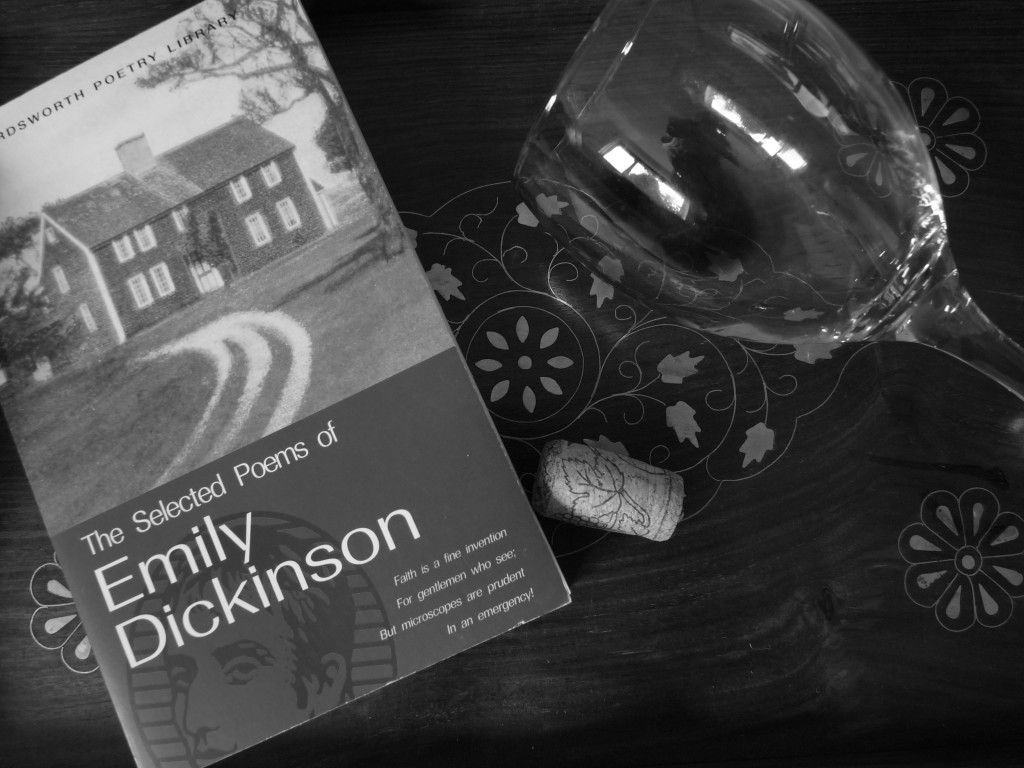I taste a liquor never brewed,
From tankards scooped in pearl;
Not all the vats upon the Rhine
Yield such an alcohol!Inebriate of air am I,
And debauchee of dew,
Reeling, through endless summer days,
From inns of molten blue.When landlords turn the drunken bee
Out of the foxglove’s door,
When butterflies renounce their drams,
I shall but drink the more!Till seraphs swing their snowy hats,
And saints to windows run,
To see the little tippler
Leaning against the sun!
(Poem 51: ‘I taste a liquor never brewed’ quoted from The Selected Poems of Emily Dickinson, Wordsworth Poetry Library)
In this poem, Emily Dickinson celebrates the intoxicating effect that comes from contemplating and embracing the beauty of creation. Grasping for an analogy of the natural world’s effect upon her, she equates it with the inebriation that comes from consuming the very best of alcohol. But for Dickinson, nature offers a beauty more exhilarating than the flavour of the finest wines:
Not all the Vats upon the Rhine Yield such an alcohol!
Dickinson’s poem takes the form of four stanzas each comprising four lines. Her verse form includes a rhyme on each second and fourth line: ‘door and ‘more, ‘run’ and ‘sun’, for instance. But she also uses a slant rhyme with ‘pearl’ and ‘alcohol’. As with many of her other works, Dickinson’s use of punctuation is unusual. Her use of dashes, particularly in the second stanza, gives the poem a certain breathless quality when read aloud, as if to emphasise the poet’s state of inebriation. By implication this is not just an ode to nature, but one to the poetic form itself.
From the first line through to the last, becoming drunk on alcohol is used as a metaphor for the heady effect of drinking in life and all the wonders nature has to offer. The effects are described in emotional, spiritual and physical terms.
Dickinson’s emotional response to nature is apparent in her happy contemplation of ‘endless summer days’ while a spiritual element is touched on with her reference to ‘Seraphs’ and ‘Saints’. But it is the physical elation that nature can produce which drives this poem: words such as ‘taste’, ‘Inebriate’, ‘Reeling’, ‘drink’ and ‘swing’ all suggest a joyful physicality. Indeed, there is a hint of almost carnal pleasure in this celebration: ‘And Debauchee of Dew – ‘
Emily Dickinson employs descriptions of colour throughout this poem to make her language all the more vivid. Her palette includes ‘Tankards scooped in Pearl –‘, suggesting the glowing white of a pearl-encrusted tankard plunging into the effervescent creamy-white bubbles of foaming beer and warm summer rain from an otherwise clear sky is hinted at by the phrase ‘Molten Blue’. Taking up the white motif once more, she evokes billowy white clouds with ‘Seraphs with their snowy Hats’.
Nature, then, offers the promise of a liquor better than any brewed by Man and, by the final stanza, a joyful Dickinson, the ‘little Tippler’, is seemingly completely at one with the universe as she steadies herself by ‘Leaning against the Sun!’
From the foxgloves of a summer meadow, up to the wispy clouds and blue sky and finally to the sun above and beyond all of this, Emily Dickinson paints a word picture of creation in all its glory. Although she spent most of her adult life in her room at home in Amherst, she shows in this poem that her imagination and her creative response to the world was limitless.


To Bobby Seal
To view a recently discovered daguerreotype of Emily Dickinson, visit http://www.kaplancollection.com.
Thanks for the link, Albert. There are so few images of Emily and I don’t think I’ve seen this one before.
That’s a lovely poem – I don’t really know Emily Dickinson’s work, and I enjoyed reading your take on it. ‘Reeling, through endless summer days’ – what a beautiful line!
Good to hear from you – glad you enjoyed the poem. I’d recommend dipping into some more of her work if you get the chance.
I like the poem.